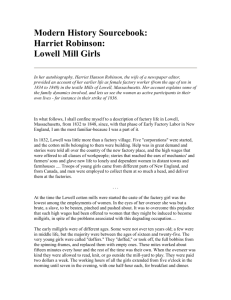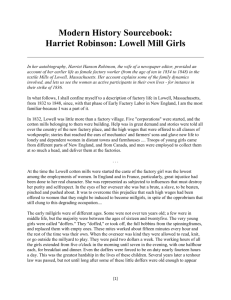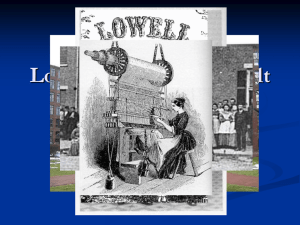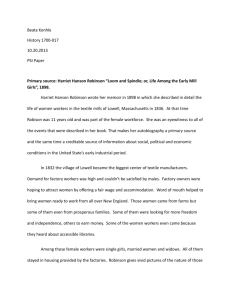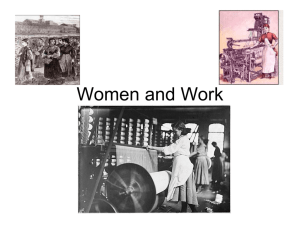United States History "Harriet Hanson Robinson, a “Lowell Girl
advertisement
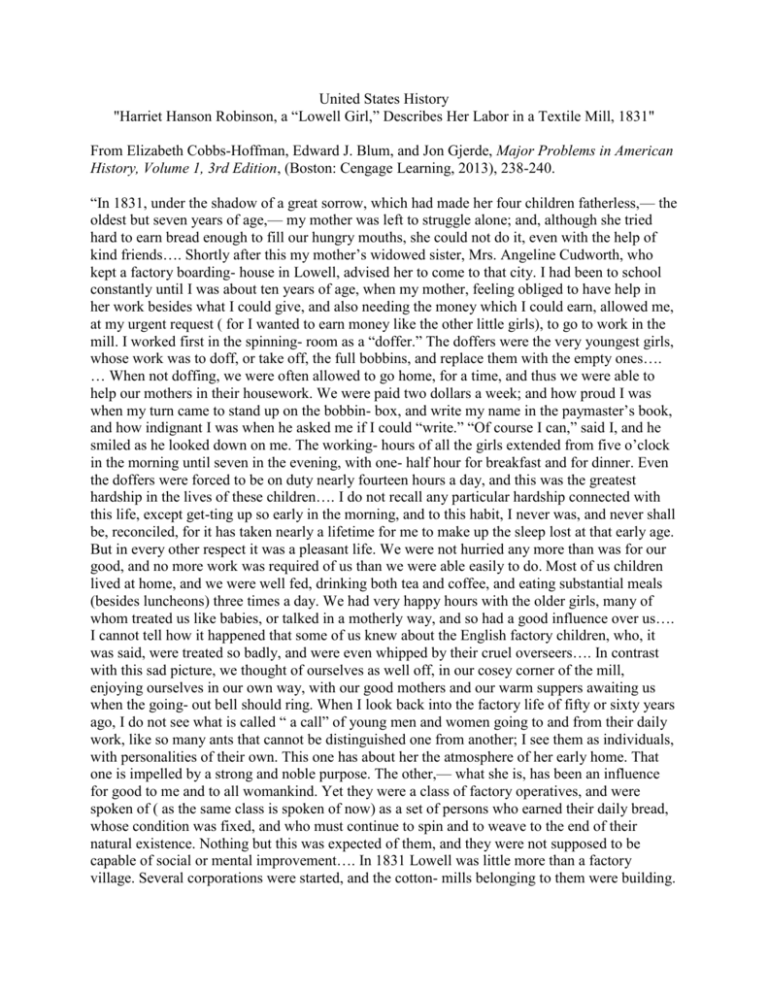
United States History "Harriet Hanson Robinson, a “Lowell Girl,” Describes Her Labor in a Textile Mill, 1831" From Elizabeth Cobbs-Hoffman, Edward J. Blum, and Jon Gjerde, Major Problems in American History, Volume 1, 3rd Edition, (Boston: Cengage Learning, 2013), 238-240. “In 1831, under the shadow of a great sorrow, which had made her four children fatherless,— the oldest but seven years of age,— my mother was left to struggle alone; and, although she tried hard to earn bread enough to fill our hungry mouths, she could not do it, even with the help of kind friends…. Shortly after this my mother’s widowed sister, Mrs. Angeline Cudworth, who kept a factory boarding- house in Lowell, advised her to come to that city. I had been to school constantly until I was about ten years of age, when my mother, feeling obliged to have help in her work besides what I could give, and also needing the money which I could earn, allowed me, at my urgent request ( for I wanted to earn money like the other little girls), to go to work in the mill. I worked first in the spinning- room as a “doffer.” The doffers were the very youngest girls, whose work was to doff, or take off, the full bobbins, and replace them with the empty ones…. … When not doffing, we were often allowed to go home, for a time, and thus we were able to help our mothers in their housework. We were paid two dollars a week; and how proud I was when my turn came to stand up on the bobbin- box, and write my name in the paymaster’s book, and how indignant I was when he asked me if I could “write.” “Of course I can,” said I, and he smiled as he looked down on me. The working- hours of all the girls extended from five o’clock in the morning until seven in the evening, with one- half hour for breakfast and for dinner. Even the doffers were forced to be on duty nearly fourteen hours a day, and this was the greatest hardship in the lives of these children…. I do not recall any particular hardship connected with this life, except get-ting up so early in the morning, and to this habit, I never was, and never shall be, reconciled, for it has taken nearly a lifetime for me to make up the sleep lost at that early age. But in every other respect it was a pleasant life. We were not hurried any more than was for our good, and no more work was required of us than we were able easily to do. Most of us children lived at home, and we were well fed, drinking both tea and coffee, and eating substantial meals (besides luncheons) three times a day. We had very happy hours with the older girls, many of whom treated us like babies, or talked in a motherly way, and so had a good influence over us…. I cannot tell how it happened that some of us knew about the English factory children, who, it was said, were treated so badly, and were even whipped by their cruel overseers…. In contrast with this sad picture, we thought of ourselves as well off, in our cosey corner of the mill, enjoying ourselves in our own way, with our good mothers and our warm suppers awaiting us when the going- out bell should ring. When I look back into the factory life of fifty or sixty years ago, I do not see what is called “ a call” of young men and women going to and from their daily work, like so many ants that cannot be distinguished one from another; I see them as individuals, with personalities of their own. This one has about her the atmosphere of her early home. That one is impelled by a strong and noble purpose. The other,— what she is, has been an influence for good to me and to all womankind. Yet they were a class of factory operatives, and were spoken of ( as the same class is spoken of now) as a set of persons who earned their daily bread, whose condition was fixed, and who must continue to spin and to weave to the end of their natural existence. Nothing but this was expected of them, and they were not supposed to be capable of social or mental improvement…. In 1831 Lowell was little more than a factory village. Several corporations were started, and the cotton- mills belonging to them were building. Help was in great demand; and stories were told all over the country of the new factory town, and the high wages that were offered to all classes of work- people,— stories that reached the ears of mechanics’ and farmers’ sons, and gave new life to lonely and dependent women in distant towns and farmhouses…. But the early factory girls were not all country girls. There were others also, who had been taught that “work is no disgrace.” There were some who came to Lowell solely on account of the social or literary advantages to be found there. They lived in secluded parts of New England, where books were scarce, and there was no cultivated society. They had comfortable homes, and did not per-haps need the money they would earn; but they longed to see this new “City of Spindles.”… It must be remembered that at this date woman had no property rights. A widow could be left without her share of her husband’s ( or the family) property, a legal “incumbrance” to his estate. A father could make his will without reference to his daughter’s share of the inheritance…. The law took no cognizance of woman as a moneyspender. She was a ward, an appendage, a relict. Thus it happened, that if a woman did not choose to marry, or, when left a widow, to re- marry, she had no choice but to enter one of the few employments open to her, or to become a burden on the charity of some relative. In almost every New England home could be found one or more of these women, sometimes welcome, more often unwelcome, and leading joyless, and in many instances unsatisfactory, lives. The cotton- factory was a great opening to these lonely and dependent women. From a condition approaching pauperism they were at once placed above want; they could earn money, and spend it as they pleased; and could gratify their tastes and desires without restraint, and without rendering an account to anybody…. One of the first strikes of cotton- factory operatives that ever took place in this country was that in Lowell, in October, 1836. When it was announced that the wages were to be cut down, great indignation was felt, and it was decided to strike, en masse…. One of the girls stood on a pump, and gave vent to the feelings of her companions in a neat speech, declaring that it was their duty to resist all attempts at cutting down the wages. This was the first time a woman had spoken in public in Lowell, and the event caused surprise and consternation among her audience. Cutting down the wages was not their only grievance, nor the only cause of this strike. Hitherto the corporations had paid twenty- five cents a week towards the board of each operative, and now it was their purpose to have the girls pay the sum; and this, in addition to the cut in wages, would make a difference of at least one dollar a week. It was estimated that as many as twelve or fifteen hundred girls turned out, and walked in procession through the streets…. It is hardly necessary to say that so far as results were concerned this strike did no good. The dissatisfaction of the operatives subsided, or burned itself out, and though the authorities did not accede to their demands, the majority returned to their work, and the corporation went on cutting down the wages. And after a time, as the wages became more and more reduced, the best portion of the girls left and went to their homes, or to the other employments that were fast opening to women, until there were very few of the old guard left; and thus the status of the factory population of New England gradually became what we know it to be to- day."
